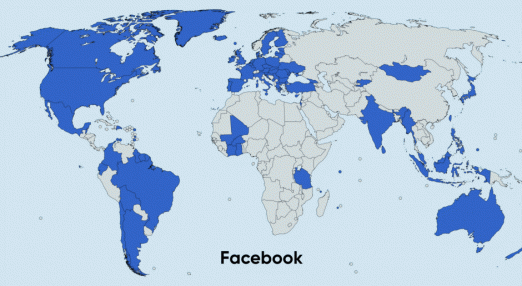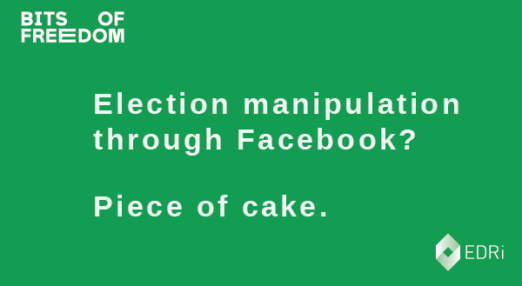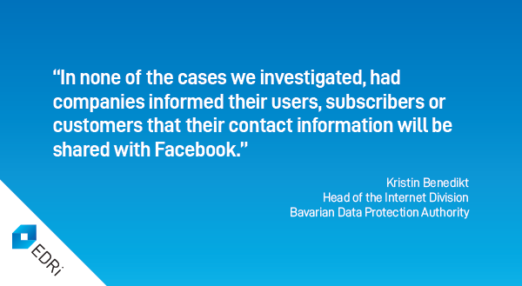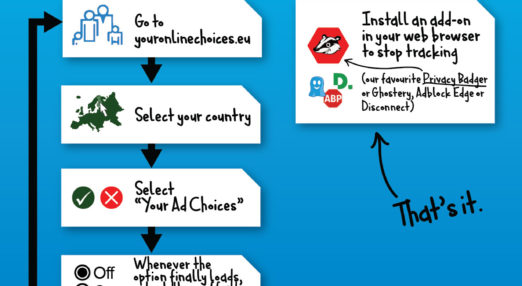advertising
Filter by...
-

Google’s FLoC Is a Terrible Idea
Google is leading the charge to replace third-party cookies with a new suite of technologies to target ads on the Web. And some of its proposals show that it hasn’t learned the right lessons from the ongoing backlash to the surveillance business model. In this post, EDRi's member Electronic Frontier Foundation (EFF) will focus on one of those proposals, Federated Learning of Cohorts (FLoC), which is perhaps the most ambitious—and potentially the most harmful.
Read more
-

Targeted Online: How Big Tech’s business model sells your deepest secrets for profit
Surveillance-based advertising which is currently the business model used by Google, Facebook and many others is harmful to people and to society as a whole because it encourages the spread of disinformation. It's also bad for the media who lose control of their ad space and suffer from decreasing revenue as a result.
Read more
-

The companies in control of our secret identities
EDRi member Privacy International published a research on ad tech companies' data collection practices which are employed to create an assumed picture of you. The study shows that the profiles created for the data subjects are based on information pieced together from incomplete data and using marketing algorithms. Hence, this data forms an uncanny picture of yourself, one that you may not have voluntarily revealed, a digital shadow over which you have very little practical control.
Read more
-

Online political ads – a study of inequality in transparency standards
In its new report, EDRi member PI looks into the implementation of transparency tools by Facebook, Google and Twitter in relation to political advertising. This work was produced in collaboration with partner organisations InternetLab and ELSAM.
Read more
-

#WhoReallyTargetsYou: DSA and political microtargeting
Europe is about to overhaul its 20-year-old e-Commerce Directive and it is a once-in-a-decade chance to correct the power imbalance between platforms and users. As part of this update, the Digital Services Act (DSA) must address the issue of political microtargeting (PMT).
Read more
-

Facebook starts to increase transparency in political ads in the Balkans
Facebook has announced that it will expand its transparency system and confirmation of authenticity of ads about elections and politics starting from mid-March. Namely, Facebook will cover 32 additional countries, including Serbia and North Macedonia where the elections are to take place very soon.
Read more
-

Facebook lies to Dutch Parliament about election manipulation
On 15 May 2019, Facebook’s Head of Public Policy for the Netherlands spoke at a round table in the House of Representatives about data and democracy. The Facebook employee reassured members of parliament that Facebook has implemented measures to prevent election manipulation. He stated: “You can now only advertise political messages in a country, if […]
Read more
-

Facebook Custom Audience illegal without explicit user consent
Online shops and marketers routinely share customer data with Facebook to reach them with targeted advertising. Turns out that in many cases this is illegal. A ground-breaking decision by a German Data Protection Authority (DPA) recently ruled that matching customers’ email addresses with their Facebook accounts requires their explicit consent.
Read more
-

Five things the online tracking industry gets wrong
The Interactive Advertising Bureau (IAB) Europe, one of the loudest enemies of the e-Privacy Regulation, is the association of online tracking and adverting companies. On 7 September, IAB Europe published a report titled: “Europe Online: An experience driven by advertising”. In the report, some of the key issues are clearly displayed, but some are hidden […]
Read more
-

#ALTwitter privacy revelation: European parliamentarian goes bananas
Recently, Mr Dunston (of the “Dunston Checks In” fame) came to the EDRi Brussels office looking for help. He complained that somebody from the European Parliament is messing up with his “holy banana collection” that he has been preserving since decades after he inherited it from his forefathers. Other than that we had no information.
Read more
-

ALTwitter: The treasure trove behind 140 characters
One of the main reasons why metadata is used broadly for surveillance and targeted advertisement is its extensive capability to capture more dimensions of useful information than the data itself. An ordinary internet user fails to see the mysterious nature of metadata because it is invisible to the naked eye. Law enforcement agencies and advertisers, on […]
Read more
-

Facing a challenge – understanding Facebook’s opt-out instructions
Following Facebook’s new changes in its terms of service, the company has provided a public relations pitch about “your information” and how Facebook “respects the choices that you make” about the advertising that you see. In particular, it says “That’s why Facebook respects the choices you make about the ads you see, across every device. […]
Read more
